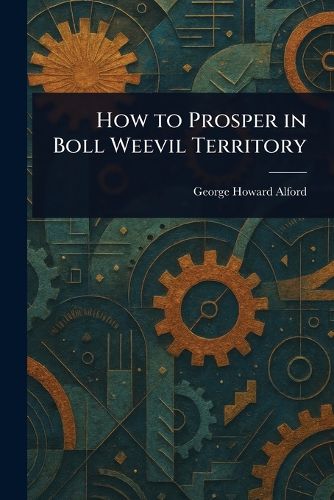Readings Newsletter
Become a Readings Member to make your shopping experience even easier.
Sign in or sign up for free!
You’re not far away from qualifying for FREE standard shipping within Australia
You’ve qualified for FREE standard shipping within Australia
The cart is loading…






This title is printed to order. This book may have been self-published. If so, we cannot guarantee the quality of the content. In the main most books will have gone through the editing process however some may not. We therefore suggest that you be aware of this before ordering this book. If in doubt check either the author or publisher’s details as we are unable to accept any returns unless they are faulty. Please contact us if you have any questions.
"How to Prosper in Boll Weevil Territory" by G. H. Alford offers invaluable insight into cotton growing and crop management in the face of adversity. This historical text, focused on agricultural techniques, explores methods of pest control specifically targeted toward the devastating boll weevil.
Originally published during a critical period for Southern agriculture, this book provides practical advice and strategies for farmers and landowners seeking to mitigate the economic impact of this pervasive pest. It examines various aspects of cotton production, offering guidance on how to adapt and thrive even in boll weevil territory.
Delving into the intricacies of agriculture and agronomy, "How to Prosper in Boll Weevil Territory" remains a relevant resource for those interested in the history of cotton growing, environmental conservation, and the challenges faced by small businesses dependent on successful crop yields. This meticulously prepared reprint offers a glimpse into the past, providing timeless lessons in resilience and resourcefulness.
This work has been selected by scholars as being culturally important, and is part of the knowledge base of civilization as we know it.
This work is in the public domain in the United States of America, and possibly other nations. Within the United States, you may freely copy and distribute this work, as no entity (individual or corporate) has a copyright on the body of the work.
Scholars believe, and we concur, that this work is important enough to be preserved, reproduced, and made generally available to the public. We appreciate your support of the preservation process, and thank you for being an important part of keeping this knowledge alive and relevant.
$9.00 standard shipping within Australia
FREE standard shipping within Australia for orders over $100.00
Express & International shipping calculated at checkout
This title is printed to order. This book may have been self-published. If so, we cannot guarantee the quality of the content. In the main most books will have gone through the editing process however some may not. We therefore suggest that you be aware of this before ordering this book. If in doubt check either the author or publisher’s details as we are unable to accept any returns unless they are faulty. Please contact us if you have any questions.
"How to Prosper in Boll Weevil Territory" by G. H. Alford offers invaluable insight into cotton growing and crop management in the face of adversity. This historical text, focused on agricultural techniques, explores methods of pest control specifically targeted toward the devastating boll weevil.
Originally published during a critical period for Southern agriculture, this book provides practical advice and strategies for farmers and landowners seeking to mitigate the economic impact of this pervasive pest. It examines various aspects of cotton production, offering guidance on how to adapt and thrive even in boll weevil territory.
Delving into the intricacies of agriculture and agronomy, "How to Prosper in Boll Weevil Territory" remains a relevant resource for those interested in the history of cotton growing, environmental conservation, and the challenges faced by small businesses dependent on successful crop yields. This meticulously prepared reprint offers a glimpse into the past, providing timeless lessons in resilience and resourcefulness.
This work has been selected by scholars as being culturally important, and is part of the knowledge base of civilization as we know it.
This work is in the public domain in the United States of America, and possibly other nations. Within the United States, you may freely copy and distribute this work, as no entity (individual or corporate) has a copyright on the body of the work.
Scholars believe, and we concur, that this work is important enough to be preserved, reproduced, and made generally available to the public. We appreciate your support of the preservation process, and thank you for being an important part of keeping this knowledge alive and relevant.